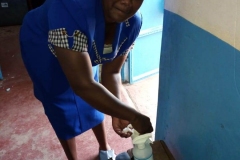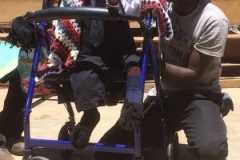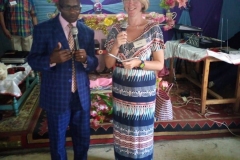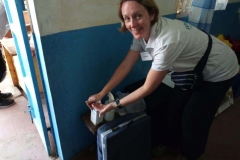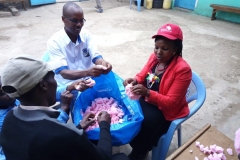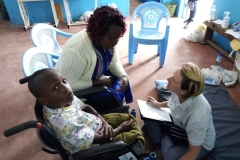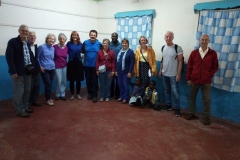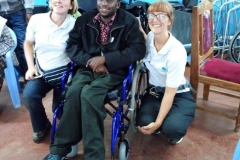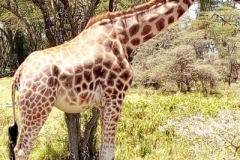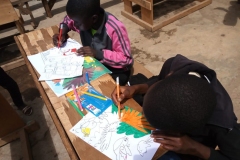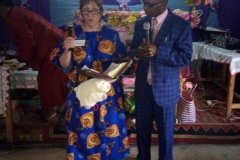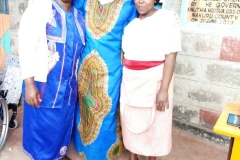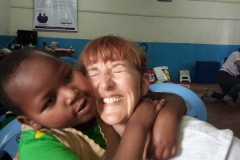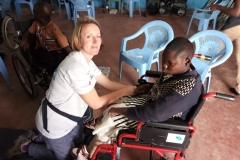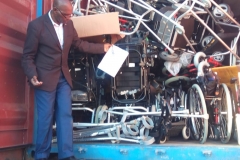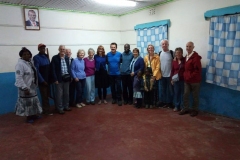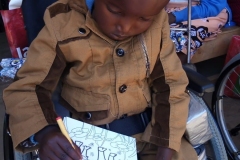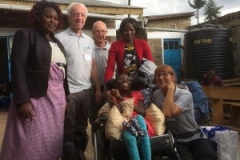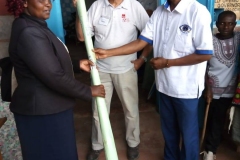Lessons from a Dolphin - Ros' Blog

One thing we often hear about from disabled people is the isolation they feel. Many disabled Christians are unable to get to church, either for lack of an accessible church locally, or lack of transport to get there. Isolation is never good; we were created by the community of the Godhead for community with Him and each other.
But is it disastrous if we can’t have fellowship with other Christians? Do we really need to meet together with others to be a “proper” Christian? Can we not follow Jesus anyway even without regularly meeting up with other believers?
The short answer is: probably, in extreme circumstances. For example, a university friend of mine who finally bowed to strong pressure from her family to accept an arranged marriage and go to live in a country where Christians are persecuted, and remained a secret believer, cut off from fellowship with others – I believe God has grace for people in circumstances like that. But it’s not how God intended it to be; He 'sets the lonely in families' (Psalm 68.6). And if we are cut off from fellowship, we have no other benchmark against which to measure our feelings and beliefs about God, our interpretation of Scripture or our understanding of what God is saying to us. So alone is possible where no alternative exists, but together is God’s intention for us.
I’ve been out on the road for Through the Roof for the past week or two, manning (or womanning!) our stand at ONE Event in Lincoln and then speaking at UCCF Forum 18 in Shropshire. Most of the time I haven’t seen or heard any news while I’ve been away, but occasionally I’ve caught a snippet on the car radio when I’ve been travelling between places. One story that caught my attention was of the dolphin in the Firth of Clyde. I wonder if you heard it too?
A dolphin, nicknamed Kylie by locals, became separated from his pod of dolphins, no one quite knows how, and ended up living on his own in the Firth of Clyde. But from 2004 onwards he has found company in the form of a school of harbour porpoises who live in the Firth. Now, scientists studying the dolphin have discovered that he has altered the noises he makes to resemble the sound made by porpoises. It’s the first known example of an animal in the wild learning to "speak" another species’ "language".
And I think this is a good analogy for what happens to us when we have regular fellowship with other believers. We begin to talk like a believer, think like a believer and, ultimately, live like a believer in Jesus Christ. When Peter was trying to deny knowing Jesus, it was his speech that gave him away – he spoke like a Galilean, and so it was futile to pretend that he was ignorant of Jesus. Those around him retorted, “Surely you too are one of them; for even the way you talk gives you away.” (Matthew 26. 73) We too, when we keep regular company with Jesus and those who love Him, begin to talk in a way that marks us out as belonging with Him.
So I would encourage you, if you are unable to meet with other believers because your circumstances or the inaccessibility of the environment prevent you from getting to church, find some other way of having fellowship with those who love Jesus. Host a group in your own home, perhaps, or set up a regular Skype conference with other people in a similar situation, in which you can study the Bible together and pray for each other. Or do this via a Facebook or WhatsApp group – there are many more ways available to our generation of connecting with each other than any previous generation has had.
As we meet together in the company of others who love Jesus, we find that, like the dolphin who now speaks porpoise, our speech begins to change. I find that I lose the grumbling and the self-pity when I meet with others who want to express their worship for Jesus. The questions that trouble my mind find answers when I hear someone else read the Bible and share what God has said to them through it. I stop my “why mes” and “what ifs” and start to speak in “thank yous” and “hallelujahs” instead.
How could you connect with other believers? And if you’re fortunate enough to be able to meet up with others whenever you want to, how could you reach out to and include those who can’t?
Wheelsblog - Kenya, Elburgon - 5th to 15th September
Wheels for the World will be fitting and distributing wheelchairs in Elburgon, Kenya from the 5th to 15th September 2018. In this video (produced by Sychem), Lucie, a therapist on the trip, tells us all about how she came to be involved, why the work is important to her, and how she's hoping to change lives.
Follow the team's journey here and on Facebook. Thank you to Sychem for producing the video, and for donating essential cleaning and santising supplies to the trip.
Be a Roofbreaker Guide
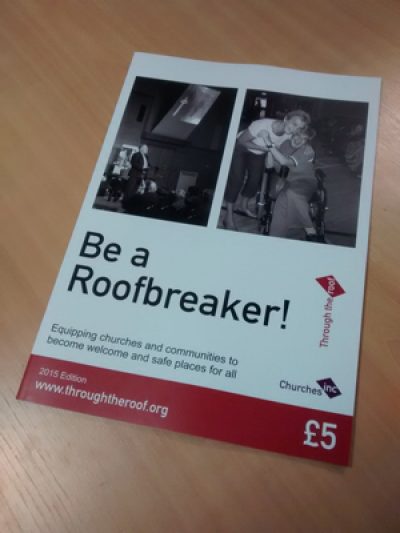
Our 'Be a Roofbreaker' guide is a great resource for helping your church or community group to become a more welcoming and inclusive place for disabled people. It includes an introduction to the theology of disability, biblical references and sections on including wheelchair users; people who are blind; people who are deaf; those with learning disabilities; mental health issues; self-harming and eating disorders; dementia, Tourette’s syndrome, and many other sections. It also contains ideas to support those who’re unable to attend church meetings and encouragement to take a person-centred approach. You can buy your copy through our secure website shop by follow this link to buy a copy of Be a Roofbreaker.
8 Steps to Easier Transitions for Autistic Young People
One issue that parents sometimes raise with us is the matter of their son or daughter making the transition from one Sunday school class or youth group stage to another. Unless you work regularly with autistic young people, you may not understand the extent of the difficulty this transition causes them. If it happens at the same time as they are changing school class or moving up from primary to secondary school or school to Further Education college (usually at the start of the autumn term), the amount of change in their life may breach by a very long way their capacity to cope with it.
The distress which this can cause them may be invisible to the church leaders, as most of it will take place at home out of their sight. It can include sleep disturbance, nightmares, self-harm, meltdowns, and other disturbed behaviours indicative of distress. Above all it can cause a deep, long-lasting psychological wound that continues to colour their experience of the world for many years to come. It’s not uncommon for parents to be dealing at home with a deeply traumatised young person for two to three years while the church remains blissfully unaware of the distress its systems and procedures have caused. So here are a few suggestions of ways to ease the transition for the young people concerned.
1. Be flexible. If your young people normally go up to the next stage at the start of the autumn term, consider choosing some other time of year for the autistic youngster – perhaps after Easter, when they’ve had a bit of time to adjust to their new class at school, but long enough to get settled in before the summer break.
2. Listen. The best people to advise you are the young person and his/her parents. However much you know about autism, you are not an expert in this particular person. Take seriously what they tell you. If they say, “He won’t sleep for a year if you take this approach” or “She will self-harm so badly that she may end up in hospital if you do it that way” don’t be tempted to think they’re exaggerating or making an undue fuss. They really are just telling it like it is.
3. Prepare very well in advance. Autistic youngsters cope best with change when there is long, careful preparation beforehand. At least a year beforehand, start talking to them about how people of their age move to the next class or stage, and the time will come for them to do this. Reassure them that their familiar friends will be doing the same. It might be wise to avoid phrases like “move up” or “go up” to the next class, as children who use language literally may take this to mean that the class is in a higher place, and be confused when it turns out to be on the same floor. Autistic people can find it difficult to visualise or imagine something they haven’t yet experienced, and this can give rise to anxiety about what to expect. Taking them to visit the new venue and familiarise themselves with it can help with this. Some children may want you to pretend or role-play the change, and some may want this many times over as the change approaches. Follow this link for a great resource, designed for schools, which you could adapt to your church situation and work through with the young person:
4. Use visual means to prepare for the change. Social Stories can be a very useful way of doing this – for an example follow this link to Lynn McCann’s material. This story could easily be adapted to fit with the church youth group or Sunday school environment. Give the child or young person a written programme with accompanying pictures so they can anticipate what will happen in the meeting and how long each item will take.
5. Make the transition gradual. Allow the child to take it at his/her own pace. For some youngsters that might mean only going to the new group once a month for the first year. Others may adapt more quickly than this. Every child is an individual and you will have to take it at their own pace. Don’t try to rush them because the young person and their family will pay the price. Some youngsters may not be ready to make the transition at the same age as their peers, and may need to stay with the younger group for 2-3 years. For others it will be important to be treated as the age they are and stay with their peers. This is another area where you will have to be guided by the young person and their family and be willing to be flexible rather than just imposing your normal “rules”. You may find it useful to have a conversation with the young person’s school teacher so as to develop an approach which is consistent with theirs.
6. Prepare the new group or class. Prepare the environment of the new class or group to ensure that it doesn’t cause undue distress or sensory overload to the autistic young person. Try to have a room that is uncluttered, with ambient lighting, neither too hot nor too cold and with comfortable seating. Lots of artwork on the walls can be confusing and overwhelming for autistic young people. But the other young people may want posters or their own artwork on the walls. One church we know of got round this by having strings along the walls on which items could be pegged. When young people wanted to display items such as their own work, these could be pegged to the strings, but they could be taken down temporarily if they caused sensory overload to anyone in the group.
7. Listen again! You may think you’ve ticked all the right boxes and everything should go smoothly. But young people change (one 9 year old we know of suddenly changed from loving water to having a massive phobia of it). So if the young person seems unsettled or unhappy, or the family come to you and tell you something isn’t working, be prepared to listen, take their concerns seriously and be flexible.
8. Don’t blame the young person. Remember that an autistic person having a meltdown that seems loud, wild or out of control isn’t misbehaving. Telling them off or trying to make them stop it will increase their overload and make the situation worse. Studies have been done tracking the brain activity of autistic people in mid-meltdown. What they revealed is almost identical to the brain activity of epileptic people in mid-seizure. In other words, this is not something the person is doing, but something which is happening to them. They can no more pull themselves together and stop it than a person having a seizure could do. So be patient and understanding. Teach the other young people to be accepting and non-judgemental of their autistic friend, and model these attitudes so that they learn them from you.
Hope for a Tree, Hope for Me (Ros' Blog)
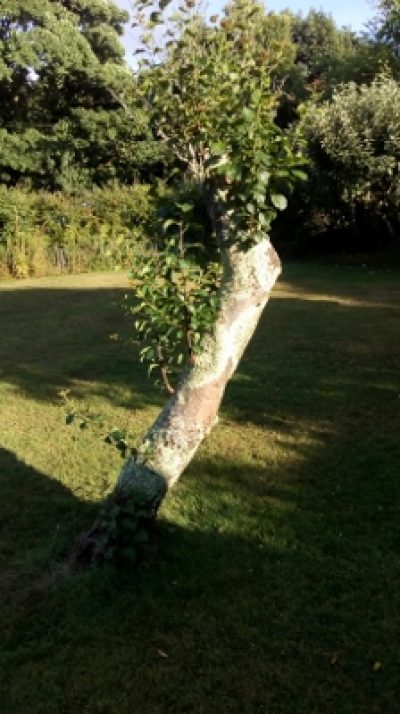
While away on holiday, I spotted this tree in the garden of the cottage where we were staying. It was little more than a stump, about four feet high, and had obviously been cut right down at some point in its past. But despite the insult to its entire system, this tree was putting out foliage in abundance, some from half way down what remained of its trunk, and some from the top of the stump. It reminded me of a beautiful piece of poetry from Job 14:
“There is hope for a tree:
if it is cut down, it will sprout again,
and its new shoots will not fail.
Its roots may grow old in the ground
and its stump die in the soil,
yet at the scent of water it will bud
and put forth shoots like a plant.”
Sometimes life pulls the rug from under us. Something happens that alters every plan we thought we had. For some that includes loss of physical abilities they once had; for others it might mean the creeping onset of a physical or cognitive impairment; for others, discovering that the child you gave birth to has additional needs and will need a lot more care, and for a lot longer, than you anticipated when you planned to have a baby. It’s like being a tree that’s cut down in its prime.
In my last post I wrote of trees that flourish in drought because their roots go down deep into the water source. And here we find water again playing a part. When life cuts us down, we wonder how we could ever flourish again the way we used to. But in this poem, the mere scent of water is said to be enough to make the plant bud again and put forth new shoots.
Sure, the tree in my picture is going to end up a very different shape from the shape it would have had if it had never been cut down. But already it’s shooting upwards again and growing an abundance of leaves. It is certainly going to be a full-sized tree again eventually, as long as no one cuts it down again. It has found water, and that water has nurtured the life in it.
And so with us. No matter how “curtailed” we feel by whatever life has brought us, we will continue to grow and flourish, to become a shape of beauty, maybe a different shape and a different kind of beauty than the one we thought we were headed for, but beautiful and purposeful nonetheless. As soon as we reach out to Jesus, the living water, and come within even just the scent of that spring, we will flourish and grow again. And that, as this passage from Job says, gives us renewed hope.
Living Water in a Time of Drought (Ros' Blog)
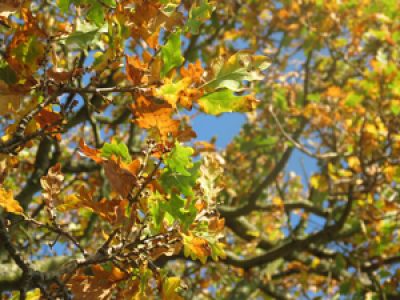
Driving around my locality recently I’ve noticed an unusual phenomenon. In the middle of July some of the trees are looking really autumnal, with leaves crinkling yellow and falling to the ground, while others are as green and fresh as you would expect at this stage of the summer. In some places it’s the smaller trees such as silver birches that are wilting, in others it’s the large and well established ones such as the really towering oaks and chestnuts. In some places it’s noticeably those with thinner trunks which seem to be suffering the effects of drought, but then in other places the effect is reversed. A neat row of slim poplars near where I live are looking as rich and green as they should be, while some really tall, thick, overgrown leylandii, while not shedding leaves, are drooping and looking withered.
You might think this has to do with their proximity to water. Surely those near rivers, lakes and streams will be well-hydrated, while those adjoining housing and roads will be more prone to dry up. However, this does not seem to be the case. I have seen side by side a flourishing tree and a tree that is dried, yellowed and shedding its leaves. There can only be one explanation and that must be that some trees have put down roots far enough to find the water that is stored deep underground, while others have not.
I’m reminded that Jesus introduced Himself to the Samaritan woman as the source of Living Water. He said that He would be a well of water springing up to eternal life within those who turn to Him as their source. Sometimes when the harsh droughts of life threaten to wither the life out of us, we need to reach down deep into that water source. What kind of harsh droughts am I thinking of? It would be too facile to say disability. My many disabled friends and family live rich and fulfilling lives. The searing heat comes not from within us – our physical or cognitive condition – but from the additional burdens placed on us by the unthinking, uncaring system in which we find ourselves.
I had to take my daughter to hospital yesterday – something she is well used to, and takes in her stride these days. She is autistic, very happily so, and enjoys her life until some thoughtless treatment causes her distress. Yesterday it was a doctor who, noting her extreme needle phobia, negotiated with her very gently, with my help, to get her consent for a blood test – and then disappeared for 45 minutes before doing the blood test, quite long enough for her to work herself into a frenzy of overwhelming anxiety about the procedure. Simply making her enough of a priority to deal with her blood test immediately would have saved her from the trauma of a meltdown – and me from being inadvertently punched in the head and stomach during the course of it!
It was very striking that on the drive home from the hospital she was asking me to turn off the radio and sing worship songs. She understood the need to reorientate herself to the One who can bring peace to her heart. She is like those trees whose roots go deep enough to find the water source. As it says in Psalm 1 (NIRV), of the person who is focused on God and His way of living, “That kind of person is like a tree that is planted near a stream of water. It always bears its fruit at the right time. Its leaves don’t dry up. Everything godly people do turns out well.”
Photo of Oak Leaves at Sim's Wood © Copyright Oast House Archive and licensed for reuse under this Creative Commons Licence
Distributing Chairs and Drawing Crowds (The Summer 2018 Vital Link)
The Summer 2018 Vital Link is now available - it's full of news about the Uganda Wheelchair distribution, where the team saw over 250 people, and fitted wheelchairs in hotel lobbies and out on the street, as well as the usual distribution centres; our new office move; holidays; retreats, and much more... Download your copy now!
Or click on the cover image below to read the Vital Link online using Joomag - you can zoom in and swap between pages much more easily that by just using a PDF reader.
A Place to Call Home (Ros' Blog)
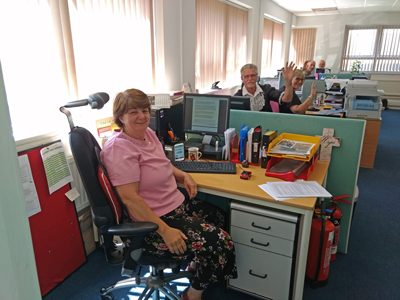
So… the dust has settled, the boxes are emptied and everything is in its proper place. Our new office is in apple-pie order, thanks largely to the efficiency and hard work of Michael, our Operations Manager. A few adjustments are needed on our part – a bit more desk sharing, board meetings have to take place elsewhere, and for most of us a slightly longer commute. But all in all the process has gone very smoothly and we are happily settled in our new home, Alpha House, Alpha Place, Garth Road, Morden, Surrey, SM4 4TQ. We’re getting to know our new neighbours, Ascension Trust, who have made us very welcome on the ground floor of their building, and on Wednesday of last week we held our first board meeting since the move, in a nearby Baptist Church.
A lot of preparation went into the move, a lengthy search for suitable premises, a lot of planning and packing, hiring of vans and marshalling volunteers. The whole process took quite a long time from start to finish. But the hard work paid off, and here we are.
All this got me thinking about a passage of Scripture that we’ve been studying at my church lately. In John 14 Jesus says these words: “In My Father’s house are many mansions; if it were not so, I would have told you. I go to prepare a place for you. And if I go and prepare a place for you, I will come again and receive you to Myself; that where I am, there you may be also.”
Our pastor challenged us to get away from the traditional understanding of these verses as referring solely to our state after death, and think about what they might be saying to us about life here and now. And when I thought it over, something struck me. The idea of Jesus having to go away and take some time to make some preparations before everything would be ready makes no sense in the light of the fact that He is eternal; He is not subject to the constraints of the passage of time or sequences of events in the way that we are. So maybe that is not what Jesus meant?
Suppose the place that needed preparing was the hearts of the disciples – and us? That reading makes sense in the light of what He goes on to say: “If anyone loves Me, he will keep My word; and My Father will love him, and We will come to him and make Our home with him.” He also refers to the Holy Spirit, who “dwells with you and will be in you.”
Perhaps Jesus was referring to the fact that His dwelling place – the hearts of men and women – was not yet ready, and so the disciples’ dwelling place needed preparation time. How could the disciples’ own hearts be their dwelling place? Because Jesus would be there – “that where I am, you may be also”.
And so the disciples plus some of the women and Jesus’ mother and brothers shut themselves away in the upper room and spent their days in prayer and fellowship until the Day of Pentecost had fully come. Then, as we know, they were transformed by the indwelling power of the Holy Spirit and the Church began its mission.
To those who live with disability, of course it’s a comfort to know that a place is ready for us when this life is over, a place where we shall be in the direct presence of Jesus, where pain and sadness will be things of the past, and God will wipe away all tears. But if that’s the only hope we have, then this life could be an irksome phase to be endured until that time comes.
And yet it’s clear, that’s not what Jesus intended. “I have come, He said, “that they may have life, and have it to the full.” And when our hearts are prepared to be a place where we and Jesus live together in unity by the Holy Spirit, even the most restricted life is transformed from mere existence to a life of fullness and abundance.
How has the experience of Jesus dwelling in you given you a sense of being “at home”? What difference does it make to those around you when you live out of that place of abundance?
Churches Inc in Tanzania: Final Blog
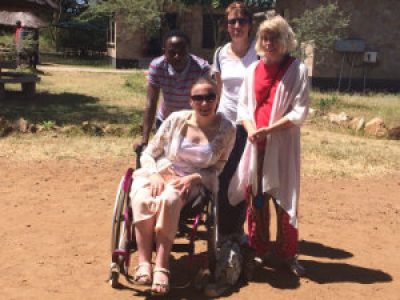
Janet, Abi, Katie, and Shaun visited Tanzania from the 6th to 16th June, working hard to deliver events and workshops, and to support church leaders and local work. Our Churches Inc. programme equips the church with a Christian perspective on disability, helping them to be fully inclusive so everyone is valued. Here's their report on the sixth day - Follow this link to the team's day 5 blog.
Final blog (jointly written in a plane somewhere over Ethiopia)
We survived the lions' den (literally) in the Serengeti and experienced some interesting off-road driving. It was a good opportunity for fellowship with Pastor Shadrack and his father (who has a disability himself) and a tour guide who is a member of their church.
As we leave Tanzania we are encouraged by the heart of Pastor Shadrack and his team for people with disabilities. We are privileged to have witnessed the work that is already taking place and to hear about the vision for the future including a centre for employment skills training. It is clear that there is a lot more work to do. We trust that by God’s grace it will be completed.
One thing that has struck us has been that by providing a safe place for people to share their stories during our workshops, it was so powerful to see people with disabilities using their gifts and the impact this had, not just on us but on others in a similar position. There was a tangible sense that people were growing in confidence and their confidence was based on a renewed understanding of their value and identity in God.
The home visits were truly humbling. Any difficulty experienced by the team only served to bring into focus the difficulties that are faced on a daily basis by people living in these communities. It also highlighted the need for a diversity of different mobility and other equipment in order to best serve the unique needs of each individual and the situation they live in.
It was such a joy to be able to leave people listening to the word of God on the Swahili audio Bibles.... in the leprosy camp the sound of audio Bibles filled the air from different directions.
This trip feels to have been extremely worthwhile and despite the range of challenges in the lead up to the trip it appears that God has been, and is, working powerfully through it.
We are grateful to everyone in the UK who has supported and prayed for us and we ask that you continue to remember the work of Pastor Shadrack and his team in your prayers. In particular please pray for the ongoing work to complete the disability centre. It is wonderful to see a local team so committed to challenging cultural attitudes, including and valuing people with disabilities and sharing the gospel message with those who are so often excluded.
By the way, we nearly came back without Abi following a marriage proposal. However, we decided the dowry of 20 cows just wasn’t enough for such a special person (and anyway we couldn’t get the cows on the plane!)
Churches Inc in Tanzania: Day 6
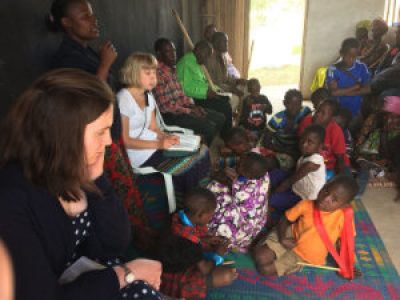
Janet, Abi, Katie, and Shaun are working in Tanzania from the 6th to 16th June, delivering and supporting Churches Inc leaders events and workshops. Our Churches Inc. programme equips the church with a Christian perspective on disability, helping them to be fully inclusive so everyone is valued. Here's their report on the sixth day - Follow this link to the team's day 5 blog.
Day 6:
Shaun left this morning to travel back to the UK.
For the rest of the team today was our last day of workshops, with some of the same people from yesterday and some new ones who joined us.
Abi acted as children’s coordinator again, teaching the children (and playing quite a lot too!)
Katie spoke about Psalm 139. People seemed to respond really well to this and it sparked off lots of conversation with testimonies and experiences being shared.
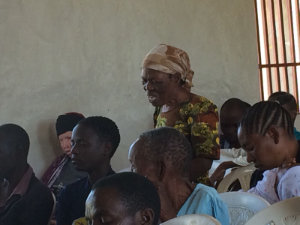 Esther, the blind lady we met on one of our home visits, had the opportunity to sing a song she had written herself about her experiences. She also gave a message about the nature of true faith in Jesus and her desire to bring others to know him.
Esther, the blind lady we met on one of our home visits, had the opportunity to sing a song she had written herself about her experiences. She also gave a message about the nature of true faith in Jesus and her desire to bring others to know him.
We had lots of opportunities to pray and worship today. Katie sang ‘In Christ Alone’ and even Beatrice our interpreter joined in leading a worship song.
We finished with an inclusive Bible story about the parable of the banquet followed by a worship session which would have been fit for any banquet.
The team is rather tired now. We’re off to the Serengeti tomorrow and just hoping we don’t fall asleep in the midst of the lions den!
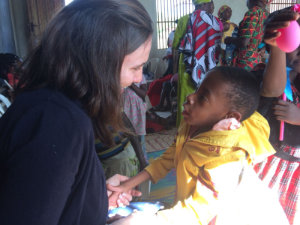 Katie with Helena.
Katie with Helena.


